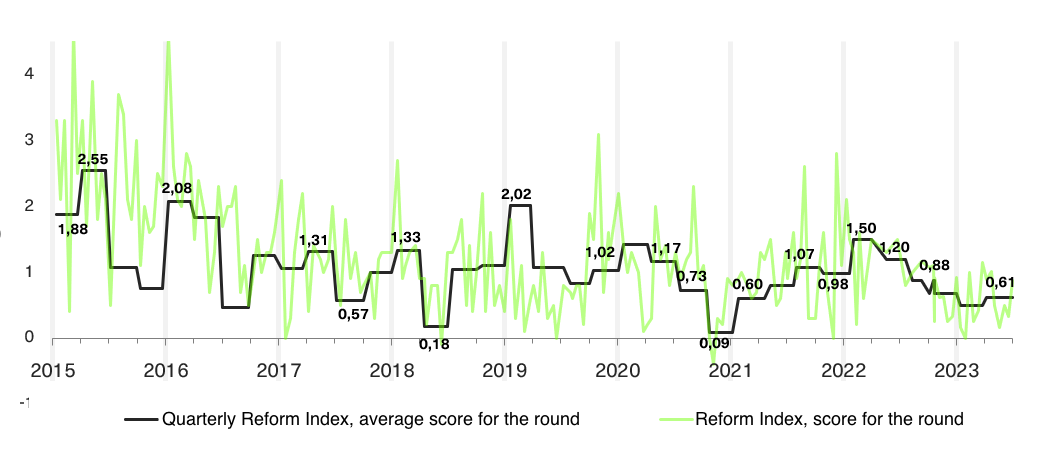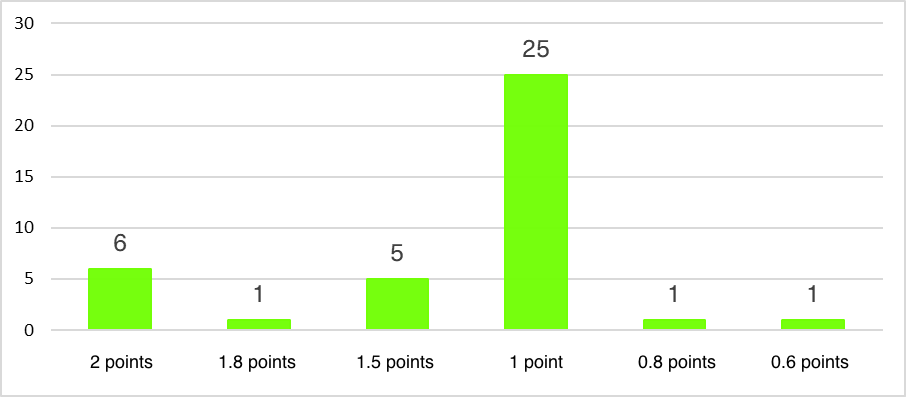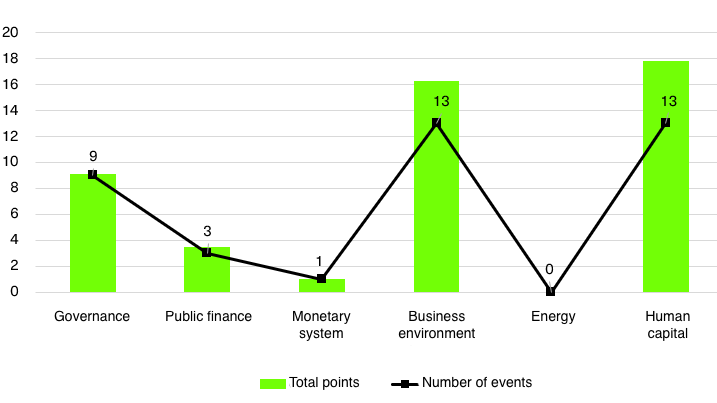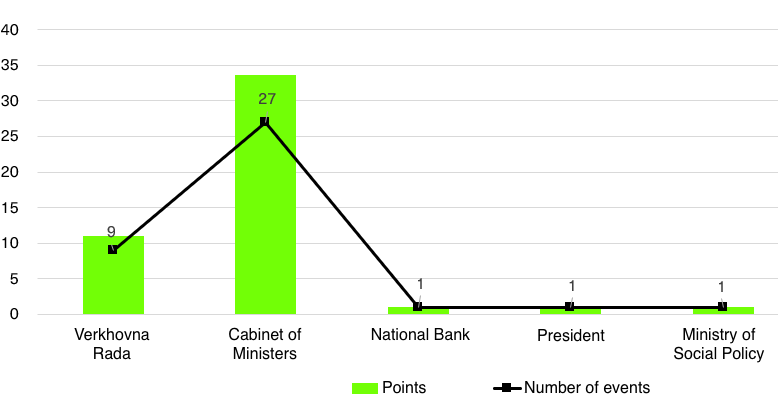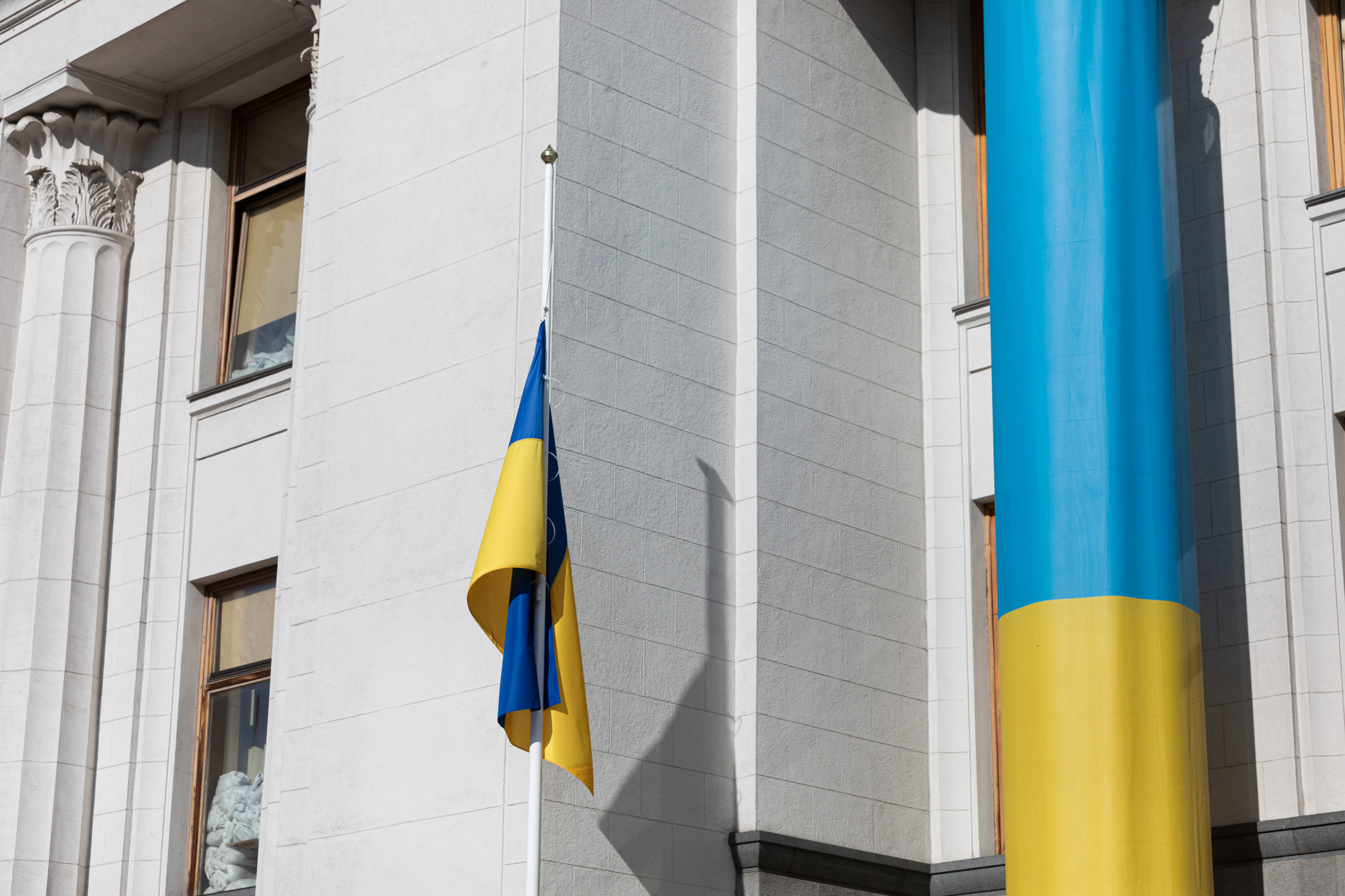At the beginning of 2023, reforms came to a halt, and in the second quarter, they still couldn’t fully pick up momentum. The number of reformative changes and their impact turned out to be moderate.
None of the reforms managed to surpass the threshold of 2 points, which distinguishes significant reforms from less important ones. However, there is also a positive aspect. No anti-reform regulations were spotted in the second quarter (as well as in the first). There were also no questionable regulations with an overall “zero” rating.
Chart 1. Reform Index’s quarterly average
Source: Reform Index’s issues 202-208
Six new regulations achieved the highest quarterly rating of +2 points (on a scale ranging from -5 to +5).
Firstly, these are laws that strengthen Ukrainization.
According to the Law on new rules for acquiring Ukrainian citizenship (Reform Index 203), citizenship can now be obtained after successfully passing exams on the Ukrainian language and knowledge of Ukraine’s history and its Constitution. Previously, it was sufficient to have “proficiency in the state language or its understanding to a degree sufficient for communication.”
By adopting Law 2309-IX (Reform Index 208), the Verkhovna Rada altogether banned the import of publishing products from Russia, Belarus, and the occupied territories of Ukraine. Previously, their import was allowed with permission from the State Committee for Television and Radio Broadcasting. After the full-scale invasion, the committee revoked licenses for importing books from Russia. Now, the new law extends the ban to printed materials from Belarus and the occupied territories. As before, the prohibition does not apply to importing up to 10 copies of such publications in personal luggage. However, this provision has been clarified: it is allowed to import only those publications that are not included in the Register of Publishing Products with anti-Ukrainian content.
The sectoral reforms also showed progress.
The law on reforming the fisheries sector (Reform Index 203) initiates the creation of a digital system called “eFish,” which will enable obtaining permits for the special use of aquatic bioresources (for industrial fishing; experimental catches). This system aims to eliminate the influence of human factors and accelerate the process of obtaining permits.
Electronic auctions for the right to the special use of aquatic bioresources, including industrial fishing, are transitioning from experimental to a permanent mode. This decision will increase transparency in the sector and ensure healthy competition among existing industrial fishers and those who wish to enter this business. In order to reduce illegal fishing, all fishing vessels will be equipped with remote monitoring devices. Additionally, fishers will be required to obtain certificates confirming the origin of aquatic bioresources.
Moreover, the law regulates the use of a fishing ticket, which is required if a fisherman plans to catch more than the daily free limit (3 kg + 1 fish, 30 crayfish).
In June, the government adopted a resolution on simplifying the certification of seeds and seedlings (Reform Index 208). Now, agricultural enterprises can provide field evaluation services for seed sowing and perennial plantings without the involvement of a state certification body. Only an auditor (agronomist-inspector) is required for this purpose. The auditor holds personal responsibility for the accuracy of the information stated in the field evaluation and rejection reports.
Healthcare continues to remain a focal point for reformers. The Cabinet of Ministers has adopted a resolution that significantly modernizes the regulation of disaster medicine (Reform Index 207). The key change is establishing six different types of mobile disaster medicine teams, depending on the case’s complexity: from those providing assistance at the scene to those delivering highly specialized care in hospitals and performing surgeries. This approach, along with the modernization of terminology in this field, will allow Ukrainian teams to obtain certification from the World Health Organization and provide assistance during natural disasters in other countries.
Finally, the law regulating the duration and financial support for service members has been amended (Reform Index 208). A military member can now receive 30 days of annual regular leave and an additional ten days of leave for family circumstances. The regular leave must be taken in parts, with each part not exceeding 15 days. Previously, military personnel were entitled to 10 days of annual leave and an additional ten days for family circumstances. The law also addresses the issue of financial support for wounded soldiers, who previously received only a few hundred hryvnias per month due to gaps in legislation. Now, they will receive the full amount of support for the first two months, with the following months providing 20.1 thousand hryvnias.
Chart 2. Number of regulations with specific scores, 2nd quarter 2023
Source: Reform Index’s issues 202-208
Progress of reforms in the areas of the Reform Index
Reform Index tracks regulatory changes across six areas: governance, public finance, monetary system, business environment, energy, and human capital. In the second quarter, the most significant advancements were made in “Human Capital,” “Business Environment,” and “Governance.” Let’s discuss them in more detail.
Chart 3. Total points of events by area, 2nd quarter 2023
Source: Reform Index’s issues 202-208
Human capital
Over the course of three months, we recorded 13 significant changes in this area. Eight of them were initiated by the Cabinet of Ministers, four by the Verkhovna Rada, and one by the President.
This direction saw four events that received a score of +2, as described earlier. Now, let’s focus on the remaining changes.
Education and Science. The government has made efforts to improve the accreditation of educational programs. The law on ensuring the quality of higher education (Reform Index 206) introduced the concept of post-accreditation monitoring. This means that the compliance of educational programs with requirements can be continuously assessed, rather than just before granting accreditation, and once every 5 or 10 years. The same law also initiates the establishment of an Appeals Board for appeals against decisions of the National Agency for Higher Education Quality Assurance (NAHEQA). However, there are some uncertainties in the law. Vira Ivanchuk, Deputy Chair of the Public Council at the Ministry of Education and Science of Ukraine, explains: “Members of NAHEQA can override the Appeals Board’s veto if they vote to overcome it by a 2/3 majority of their composition. Almost all decisions of NAHEQA are currently made unanimously, so this could nullify any decision of the Appeals Board, in which case, its establishment and the expenses associated with it would be futile.”
Changes have also been introduced in the state accreditation of higher education and research institutions’ scientific activities (Reform Index 204). The resolution expanded the requirement for such accreditation to cover higher education institutions. Additionally, to assess the scientific activity of institutions more accurately, foreign experts (except representatives of the state-aggressor country) are allowed to be involved. This accreditation is mandatory for state and municipal institutions, while private institutions may choose to undergo it voluntarily.
Labor market. In April, the President signed a new law on collective agreements (Reform Index 203). It clarified the terminology in this area. In addition to the collective agreement between employees and employers, it is now possible to conclude a general, territorial, or sectoral collective contract regulating labor relations at the corresponding level. For instance, the Cabinet of Ministers can extend the effect of a sectoral agreement to all employers in a particular industry with more than ten employees. The law also allows for the accession of new entities to existing agreements and contracts and the suspension of specific provisions with the parties’ consent in case of force majeure. Another law in this sphere relates to the protection of the rights of labor migrants (Reform Index 203). Henceforth, intermediary companies offering Ukrainians jobs abroad must bear the costs, not job seekers. Violators of this requirement will be subject to fines ranging from 2 to 5 thousand non-taxable minimum incomes (UAH 34,000 – 85,000).
Healthcare and Social Protection. The long-standing issue of military medical examinations for service members has finally seen progress. In order to expedite the process and reduce waiting times, soldiers are now allowed to undergo military medical checkups in civilian hospitals (Reform Index 203). For this purpose, the National Health Service of Ukraine has created a new service package called “Medical Examination of Individuals conducted at Territorial Centers for Military Recruitment and Social Support.” Additionally, the rules for providing financial assistance in the event of death or disability of volunteers have changed (Reform Index 202). Previously, aid was only granted if a volunteer was injured or killed in the territory of Luhansk and Donetsk regions (the area of the Joint Forces Operation). Now, this assistance applies to the entire territory of Ukraine if the volunteer provided aid to the military in connection with Russia’s aggression. Furthermore, the state has established a Unified Register of Deported Persons, including children (Reform Index 203), as, according to the President of Ukraine’s statement in May 2023, more than 19 thousand children were deported to Russia.
In the spring, the rules for providing social services for injured production workers also changed (Reform Index 204). Now, service recipients can choose to receive these services from professional providers listed in the relevant register or opt for monetary compensation instead.
Business environment
In the second quarter, the government adopted 13 significant regulations in this area, with 11 being credited to the Cabinet of Ministers and two to the Verkhovna Rada. The rules concerning the fishing industry and seed certification received a score of +2 and were described earlier. Now, let’s look at events with a lower score.
Deregulation. In the spring, the authorities simplified regulatory procedures in the civil aviation industry (Reform Index 203). Aircraft certified by the European Union Aviation Safety Agency (EASA) will no longer require additional certification in Ukraine. The rules for conducting commercial flights were also streamlined: certified carriers no longer need to obtain the right to operate Ukrainian air routes, permits for departure from Ukrainian airports, and landing or overflight permissions over the country. It will be sufficient for them to coordinate slots at national airports. The requirement to obtain a certificate of compliance for ground-handling organizations has also been canceled, transitioning to a declarative principle of responsibility.
The provision of household services to the population was also simplified (Reform Index 207). The outdated requirement for mandatory service certification was abolished since the state certification system ceased to exist back in 2018, along with the requirement to maintain a book of feedback and suggestions for service provision. Instead, service providers were obliged to accept non-cash payments and provide services in the state language or, upon the consumer’s request, in another language acceptable to both parties.
At the beginning of summer, simplifications also reached the transport sector (Reform Index 207): state registration (re-registration) and deregistration of vehicles can now be done online. The government also lifted the mandatory requirement for expert examination of vehicles and registration documents in all cases except for the initial car registration in Ukraine. However, such an assessment can be performed upon the owner’s or buyer’s request.
Harmonization of legislation with the EU. The law on strengthening intellectual property rights protection (Reform Index 203) provides for the possibility of withdrawing from circulation goods that were manufactured in violation of intellectual property rights, as well as items used in their production. In case the wrongdoing was committed unintentionally and without negligence, a one-time monetary compensation for the infringement is proposed.
During the summer, changes were made to the Law on Advertising (Reform Index 208). A significant change was the introduction of regulation for advertising on shared access platforms, as well as in messengers and bots. Such advertising must now be clearly marked, and spam is prohibited. This law also banned advertising by residents of the aggressor country.
In the second quarter, Ukraine adopted a resolution that aligns the Ukrainian Classification of Goods for Foreign Economic Activity (UCGFEA) with the European one (Reform Index 208). Within 120 days (by the end of October), the State Customs Service is required to publish information regarding the correspondence of product codes specified in EU regulations to the codes of the current version of the UCGFEA.
State control. Ukraine introduced mandatory automated systems for monitoring emissions of pollutants (Reform Index 202), which are required to be installed on equipment that generates emissions (“on the pipe”). This is a positive decision but not comprehensive since such monitoring is only mandatory for new equipment. In contrast, old (including Soviet-era) equipment can continue operating as before, not only polluting the environment with emissions but also burdening the energy system due to its energy inefficiency. It is worth mentioning that the energy intensity of the Ukrainian industry per unit of output is still twice as high as the world average.
In the second quarter, there were changes to the state control rules in the field of technological and technical safety (Reform Index 206). The mechanisms for such regulation were more clearly defined, including examining construction projects, licensing services and works related to fire safety, liability insurance, monitoring, and forecasting emergencies. Enterprises were required to ensure unimpeded access for emergency rescue services to conduct monitoring of anti-accident measures and for civil defense forces to carry out emergency rescue operations in case of fire or other hazardous events.
State support. In the spring, the government approved criteria for providing state aid to support regional development and small and medium-sized businesses (Reform Index 203). The resolution established rules for calculating the maximum amount of state aid (50-70% of eligible expenses for state aid, depending on the size of the enterprise) and set a requirement for the presence of a stimulating effect from the state aid. This means that the enterprise applied for state aid before the start of the project and can demonstrate that without the assistance, the project would not have been implemented or would have been insufficiently profitable.
Additionally, the Cabinet of Ministers created the opportunity for shipowners to receive compensation for war risks (Reform Index 206) if the insurer refused to compensate them. Compensation can be obtained for the destruction or loss of a vessel, damage to cargo, the cleanup of environmental pollution, or harm to the life and health of passengers or crew members. The amount of compensation cannot exceed the size of the insurance indemnity provided for in the existing insurance contract or the P&I policy. The total amount of compensation is limited to UAH 20 billion, allocated for this purpose in the state budget for 2023.
Governance
During the three months, nine reforms took place in the field of governance, with seven initiated by the Cabinet of Ministers and two by the Verkhovna Rada. The main changes in this sphere are outlined below.
Ecology. The government allowed the establishment of local conservation zones to preserve biodiversity (Reform Index 205). The document provides an open mechanism for creating protected areas based on the scientifically proven presence of objects that require preservation. This includes animals and plants listed in the Red Data Book, historic or unique trees, and valuable natural ecosystems. Any legal entity, including scientific research institutions or public organizations, can initiate the establishment of a conservation zone. The period for creating such a zone is 30 days, with the decisions being made by regional administrations.
In the second quarter, a law on the state environmental information monitoring system was adopted (Reform Index 203). It includes monitoring air, water, soil, forests, biodiversity, waste, and physical factors of influence (noise, vibration, radiation, temperature), as well as processing and analyzing information and forecasting changes to make informed management decisions. This data is planned to be integrated into the pan-European network for collecting, exchanging, and using environmental data and information (SEIS) administered by the European Environment Agency.
Management of state property. The procedure for terminating state enterprises (where the state’s share is over 50%) by the decision of the State Property Fund was approved (Reform Index 204). Such a decision can be made if an enterprise is not subject to bankruptcy proceedings and no decision has been made regarding its privatization. During the termination process, creditors of the enterprise can submit their claims, which will be satisfied from the assets of the enterprise. If the enterprise’s own resources are insufficient, bankruptcy proceedings begin, and the enterprise’s assets are sold through electronic auctions. If the value of the seized SOE’s property exceeds the amount of debt owed to creditors by at least 20%, it can be sold as a single lot on electronic auctions to settle the debts.
Who is the biggest reformer?
In the previous year, the Verkhovna Rada initiated most of the reforms. However, the situation has changed this year, and the Cabinet of Ministers is now leading the way in providing significant progress. The Cabinet not only adopts important resolutions but also exercises its legislative initiative by preparing reform-oriented laws.
During the second quarter, the Cabinet of Ministers prepared 18 reform-oriented resolutions, one order, and eight laws, placing it at the top among the government bodies driving reforms. The Verkhovna Rada accounted for nine regulations. The President, the National Bank, and the Ministry of Social Policy (with its own “eRecovery” project for children) shared the third place.
Continuing reforms during wartime gives hope for a better future. However, the current changes are still insufficient for Ukraine’s accession to the EU and NATO, nor are they enough to fully satisfy the demands of Ukrainians who consider the fight against corruption, healthcare, and judicial reforms the most pressing priorities for 2023.
Chart 4. Reform initiators in the 2nd quarter of 2023
Source: Reform Index’s issues 202-208
Compared to the previous quarter, in the second quarter of 2023:
- The number of events almost doubled, from 22 to 39.
- The average round score slightly increased from 0.5 to 0.6 points.
- The average event score grew from 1.1 to 1.2 points within a range from -5 to +5.
Attention
The author doesn`t work for, consult to, own shares in or receive funding from any company or organization that would benefit from this article, and have no relevant affiliations
